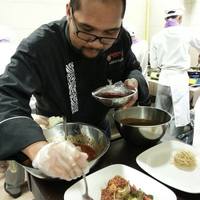ahmad sahir jais
Tun Syed Nasir Ismail Polytechnic, Chemical and food Technology, Department Member
This article explores the differences between correction, corrective action, and preventive action within a Halal Internal Auditing (HIA). Understanding these differences allows the auditor, auditee and audit client to effectively manage... more
This article explores the differences between correction, corrective action, and preventive action within a Halal Internal Auditing (HIA). Understanding these differences allows the auditor, auditee and audit client to effectively manage and prevent nonconformities, ensuring compliance with halal standards and delivering safe products to consumers.
Research Interests:
The Halal Assurance System gets a yearly checkup from top bosses and the Internal Halal Committee (IHC) to ensure it stays functional and effective. These planned reviews, usually in November, need everyone involved to prepare beforehand.... more
The Halal Assurance System gets a yearly checkup from top bosses and the Internal Halal Committee (IHC) to ensure it stays functional and effective. These planned reviews, usually in November, need everyone involved to prepare beforehand. It is a must for department managers and IHC members to show up, showing how everyone needs to be responsible and work together. If things come up, like unexpected stuff, the bosses can decide to have the review earlier or later. The results help set clear goals, actions, and where to put resources. The detailed results are shared, ensuring the whole Halal Assurance System is looked at closely, improving it over time.
Research Interests:
In the recent changes of the Malaysian halal Certification Manual procedures (MMPHC (D) 2020), requires micro and small industries to create a Halal internal control mechanism, which previously non-existent. The requirements were detailed... more
In the recent changes of the Malaysian halal Certification Manual procedures (MMPHC (D) 2020), requires micro and small industries to create a Halal internal control mechanism, which previously non-existent. The requirements were detailed out in the Malaysia Halal Management Systems (MHMS 2020). The following documents and manuals are the interpretation of that requirements and could be based as the template for developing an IHCS program.
Research Interests:
Research Interests:
Procurement activities are essentially the key point within halal assurance system. The process here is detrimental to kept non halal food from entering the halal supply chain altogether.
Research Interests:
Research Interests:
Research Interests:
Decision tree techniques was used to assess the possibility of Halal Critical Point (HCP) manifesting itself in the Halal slaughtering and processing flow. The Assessment branches into Four (4) distinctive areas which relates with halal... more
Decision tree techniques was used to assess the possibility of Halal Critical Point (HCP) manifesting itself in the Halal slaughtering and processing flow. The Assessment branches into Four (4) distinctive areas which relates with halal slaughtering. The slaughtering procedures, tools, slaughterer and the animal have been identified as the four pillars of Halal slaughtering. Humane and hygienic treatment has been added as to ensure, both Halal and Toyyiban aspect are covered in the process. Humane treatment have been found to be detrimental to the livestock being slaughtered as it has a direct consequences on the livestock wellbeing and meat quality, thus affecting the Halal integrity, as a whole.
Research Interests:
Research Interests:
Research Interests:
Research Interests:
This is part of Halal Auditing books.Enquiries and purchase details are in the documents.
Research Interests:
This is a nine-year-old document that was created in 2010. Some of the content may not be relevant or consistent with the current body of knowledge, fatwa, legislative documents or requirement by the authority. I am keeping it here as I... more
This is a nine-year-old document that was created in 2010. Some of the content may not be relevant or consistent with the current body of knowledge, fatwa, legislative documents or requirement by the authority. I am keeping it here as I feel that some of the content still beneficial to some. Please use the information cautiously, and do refer to other sources for confirmation and validity - Regards, author (Ahmad Sahir Jais).
Research Interests:
Research Interests:
Research Interests:
Process Flow for Internal Halal Auditing
Research Interests:
Halal Assurance System (HAS) is an integral part of a company’s halal integrity, especially for halal certification purposes. It will ensure that halal practices is implemented, company-wide, with accuracy and diligent. With HAS, the... more
Halal Assurance System (HAS) is an integral part of a company’s halal integrity, especially for halal certification purposes. It will ensure that halal practices is implemented, company-wide, with accuracy and diligent. With HAS, the level of products and services reliability and consumer confidence will increase, knowing that halal is adopted systematically and according to Shariah law.
To set up a HAS system, simplistic yet functional, is not an easy task. It requires commitment from all stakeholders, especially the management and the employee. The main objective of HAS is to minimize halal risk, reducing the fallout in the worst case scenarios and eventually initiate a corrective action.
This book will help foodservice managers and food producers in creating HAS system within their organization. The setting up process is based on the Halal Certification Manual Procedure (2nd Revision 2014) and The Guidelines for Halal Assurance Management System 2012 develop by JAKIM.
To set up a HAS system, simplistic yet functional, is not an easy task. It requires commitment from all stakeholders, especially the management and the employee. The main objective of HAS is to minimize halal risk, reducing the fallout in the worst case scenarios and eventually initiate a corrective action.
This book will help foodservice managers and food producers in creating HAS system within their organization. The setting up process is based on the Halal Certification Manual Procedure (2nd Revision 2014) and The Guidelines for Halal Assurance Management System 2012 develop by JAKIM.
Research Interests:
This Template can be used as the basis for a simple Halal Assurance system for foodservice and food manufacturer. It has been designed to be compliance with the guidelines regulated by JAKIM
